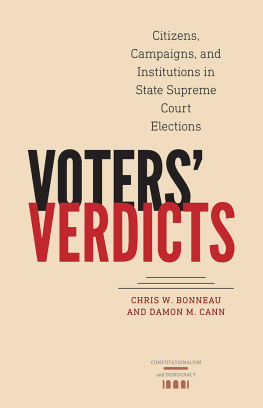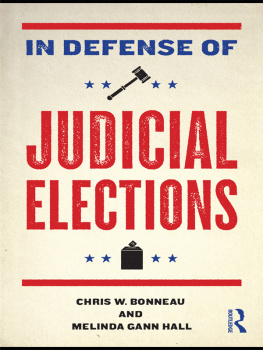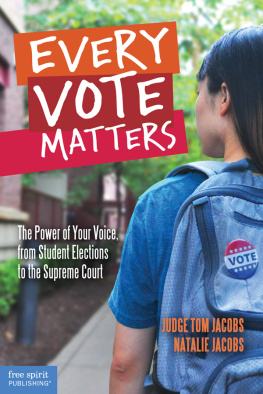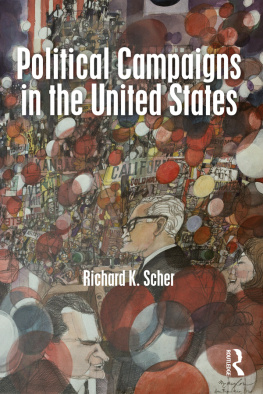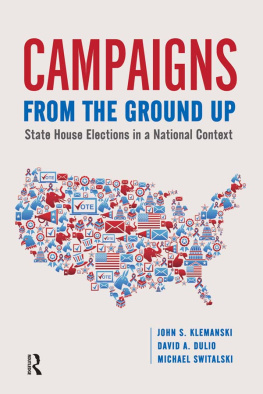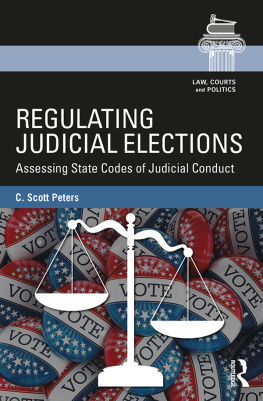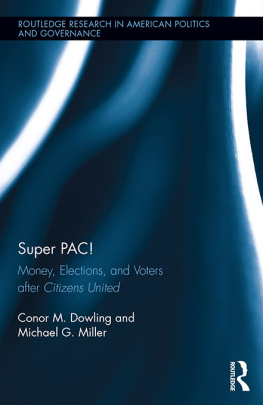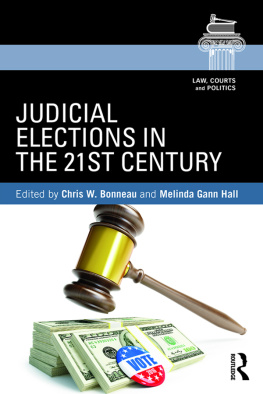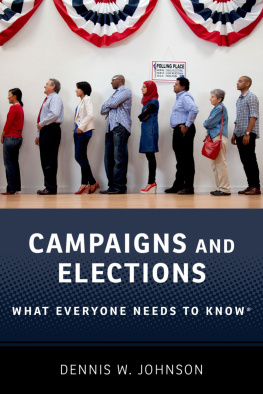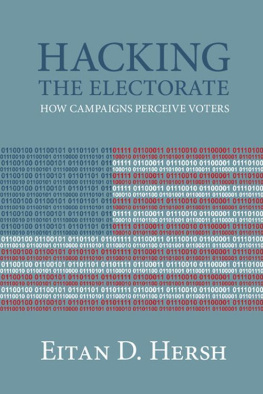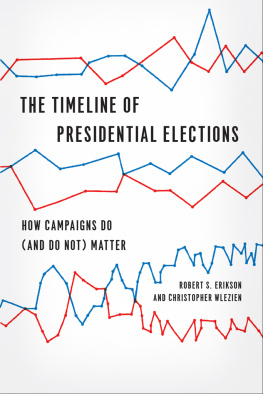Voters Verdicts
CITIZENS, CAMPAIGNS, AND INSTITUTIONS IN STATE SUPREME COURT ELECTIONS
Chris W. Bonneau and Damon M. Cann
UNIVERSITY OF VIRGINIA PRESS CHARLOTTESVILLE AND LONDON
University of Virginia Press
2015 by the Rector and Visitors of the University of Virginia
All rights reserved
Printed in the United States of America on acid-free paper
First published 2015
9 8 7 6 5 4 3 2 1
LIBRARY OF CONGRESS CATALOGING-IN-PUBLICATION DATA
Bonneau, Chris W., author.
Voters verdicts : citizens, campaigns, and institutions in state supreme court elections / Chris W. Bonneau and Damon M. Cann.
pages cm. (Constitutionalism and democracy)
Includes bibliographical references and index.
ISBN 978-0-8139-3759-5 (cloth : alk. paper) ISBN 978-0-8139-3760-1 (e-book)
1. JudgesUnited StatesStatesElection. 2. Courts of last resortUnited StatesStatesElection. 3. CourtsUnited StatesStatesElection. 4. Courts of last resortUnited StatesStates. 5. VotingUnited States. 6. Elections. I. Cann, Damon M., 1976 author. II. Title.
KF8776.B66 2015
324.973dc23
2014034590
Constitutionalism
and Democracy
GREGG IVERS AND
KEVIN T. MCGUIRE,
EDITORS
To Heather Rice, Robinson J. Rice-Bonneau, Boss Rice-Bonneau, & Izzo Rice-Bonneau, who continue, without fail, to cast their votes for me. CWB
To Clair, Cambria, Ian, Colton, and Bradley, who have faithfully retained me as a husband and father even though I may not make a parental nominating commissions top 3 list. DMC
ACKNOWLEDGMENTS
As with all long-term projects, we (collectively and individually) have racked up a lot of debts. Collectively, this work has benefited from the comments and suggestions of numerous colleagues: Melinda Gann Hall, Bobbi Herzberg, Mark Hurwitz, Mike MacKuen, Randy Simmons, Walt Stone, and Sarah Treul. We also presented portions of this work at UCDavis and UNCChapel Hill and greatly benefited from comments from seminar participants there. Thanks to Todd Curry for sharing his data on which states denote incumbency on the ballot, which we used in chapter 4. We are appreciative of Larry Aspin for sharing his data on the 2012 retention elections that we used in chapter 5. An earlier version of chapter 2 and part of chapter 3 was published in Political Behavior, and the referees there (and at other journals) helped strengthen that analysis. We also acknowledge Jeremy Pope, Quin Monson, and David Barker, who helped to coordinate the swapping of questions across modules on the 2010 Cooperative Congressional Election Study (CCES) that allowed us to ask judicial vote choice questions of more respondents, and Steve Ansolabehere, who supported our request to put judicial vote choice on the 2012 CCES common content. Finally, portions of this project were funded by the Milton Merrill endowment in Utah State Universitys Political Science Department, which supported our acquisition of shares of the CCES in 2010 and 2012, and the Richard D. and Mary Jane Edwards Endowment Publication Fund at the Dietrich School of Arts and Sciences at the University of Pittsburgh, which funded the composition of the index.
Our editor, Dick Holway, and the staff at UVA Press have been extremely helpful, thorough, and professional throughout the project. The book publication process can be a bit onerous; working with UVA was truly pleasurable.
Bonneaus biggest intellectual and professional debt is to Melinda Gann Hall, who has been a fantastic role model for him over the past sixteen years. Everyone should be so fortunate to have such a caring and generous advisor. He is also grateful for the encouragement, support, and friendship of Kris Kanthak, George Krause, and Jon Woon, which has greatly improved the quality of this book. David Klinowski provided helpful research assistance for the conclusion. The faculty at Utah State were always very welcoming and generous with their time (and their students) in my trips out there. As always, Heather Rice has been an invaluable source of patience, strength, and good humor throughout the project.
Cann would like to thank his senior research seminar students from spring 2010 and spring 2012, who helped craft some of the questions that appeared on the CCES. He also thanks Andy Pierucci for helpful research assistance on the experiments in chapter 4. Finally, thanks are due to my USU colleagues, especially Greg Goelzhauser, Bobbi Herzberg, Michael Lyons, Randy Simmons, and the USU Political Economy Lunch Group, who offered helpful comments on life and scholarship. Extra thanks are due to Michael Lyons, Bobbi Herzberg, Kristen Dawson, and Lauren Fairbanks, who have allowed me to use their class time to recruit research subjects.
Finally, this collaboration is evidence that you never know where or when you are going to meet smart people with similar ideas. Specifically, we began talking about our common research interests at a job interview that did not have a positive result. We began emailing and exchanging comments on each others work soon thereafter and eventually began writing together. Sometimes success can be born from failure.
INTRODUCTION: THE LANDSCAPE OF JUDICIAL ELECTIONS
My name ID hovers between slim and none, and voters know far more about their American Idol judges than their Supreme Court judges. The crass bottom line is that you spend 99 percent of your time raising a colossal fortune that you then use to bombard voters in hopes of branding your name onto a tiny crevice in their short-term memory for a few fleeting moments.
Texas Supreme Court justice Don Willett, An Elected Judge Speaks Out against Judicial Elections
Judicial elections have been described by critics as a failed experiment (OConnor and McGregor 2012), economically inefficient (Chertoff 2010, 48), a real and increasing threat to... fair and impartial courts (OConnor and McGregor 2012, 1742), wild, crazy, raucous, radical, nightmarish (Pozen 2008, 307), and dominated by special-interest spending and politics on courts (Bannon et al. 2013, 27). Indeed, some have even argued that unqualified voters may now seem especially likely to make bad choices because a race to the bottom in judicial campaign tactics will lead them to pick politically appealing yet lower-quality candidates (Pozen 2008, 304), and electing judges can lead to the death of criminal defendants (Brandenburg 2014).
As the nature of these races has been changing, they have drawn more attention from interest groups, the media, policymakers, and scholars. It is fair to say that over the past ten years, there has been an explosion of scholarship on judicial elections (for field essays on the current state of literature, see Bonneau 2012 and Gill 2013). Much of the debate has been about the desirability of electing judges as well as how well these elections actually function.
At the heart of judicial elections are the voters. Yet, although we have learned a great deal about the nature of these elections from prior work, we know relatively little about how voters behave in these elections. What factors determine participation? Or vote choice? What information is useful for voters to have? What information is extraneous? These questions go to the heart of judicial elections as efficacious mechanisms to promote accountability and ensure that judges are faithfully discharging their duties. This book offers a theoretical framework for understanding citizens behavior in judicial elections by integrating individual-level factors with institutional and campaign-based explanations in a comprehensive analysis for understanding participation and vote choice in judicial elections. Without this, we cannot ascertain the determinants of the behavior of individual voters. Moreover, by combining race-level variables (such as quality challengers, campaign spending, etc.) with individual-level survey data, we will be able to explore important variations among races within a state, as well as races between states.

